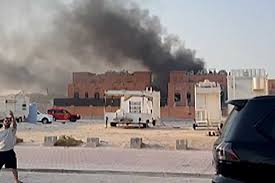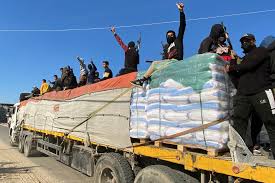You can read my Substack offering “Dear Mayor Mamdani” here.


You can read my Substack offering “Dear Mayor Mamdani” here.

The last time I recall seeing the “Nuremberg Defense” mentioned in the news was back in 1970, when I was in high school.
It has come up today in the context of a video message from Democratic lawmakers, reminding members of the military that they must refuse to obey illegal orders.
My thoughts on the matter are here.

Remarkably, in response to Avimelech’s protest over being punished for taking Sarah, Hashem confirms the king’s insistence that he had acted innocently, believing that Avraham and Sarah were, as they had claimed, brother and sister.
“I, too, knew,” Hashem tells Avimelech in a dream, “that it was in the innocence of your heart that you did this” (Beraishis, 20:6).
So, if Avimelech was innocent in taking Sarah, why didn’t Hashem merely prevent the king from approaching her? Why were he and his family and entourage physically punished?
Perhaps the answer lies in what Avraham told Avimelech, when the king demanded an explanation for having misled him:
“Because,” Avraham explained, “I said ‘There is no fear of G-d in this place’” (ibid, 11).
A leader, that tells us, has the ability, and responsibility, to influence the mores of his society. And if a society evidences lack of “fear of G-d,” its leadership is implicated in the evil.

The most comical reactions to Israel’s airstrike earlier this month on a building in Qatar’s capital Doha came from the group whose leaders were the strike’s targets.
That would be Hamas, which called the attack “a heinous crime, a blatant aggression, and a flagrant violation of all international norms and laws.” Words that nicely describe the goals and daily diet of the lynch mob itself.
Second place in risibility went to Palestinian Islamic Jihad, which condemned the strike as a “blatant criminal act.” This, from a group whose dozens of terrorist attacks include detonating a bomb in a Hadera market in 2005, killing seven people and injuring 55; another one the following year in a Tel Aviv eatery that killed eleven and injured 70; and a suicide bombing at an Eilat bakery that killed three.
Then, of course, were the expected words of condemnation from the usual pack of wolves, like Iran, Pakistan, Lebanon, Iraq, Morocco, Syria, Sudan, Kuwait, Egypt, Algeria, Oman, Turkey, the UAE and Libya. And let’s not slight Kazakhstan, Mauritania and the Maldives.
Joining the clamoring canines were Jordan, Spain, Italy, Germany, the European Union, the United Kingdom and France.
And, at least perfunctorily, the U.S. too. White House press secretary Karoline Leavitt told reporters that “Unilaterally bombing inside Qatar, a sovereign nation and close ally of the United States that is working very hard and bravely taking risks with us to broker peace, does not advance Israel or America’s goals.” (We’ll leave the highly debatable description of the country unaddressed for now, due to space limitations.)
Ms. Leavitt did add, though, that “However, eliminating Hamas, who have profited off the misery of those living in Gaza, is a worthy goal.”
Nevertheless, the U.S. did join the other members of the United Nations Security Council in condemning the strike.
Ah, such short memories some have. Does no one recall how, on May 2, 2011, the Obama administration violated the territorial integrity of Pakistan, in Operation Neptune Spear, when SEAL Team Six members shot and killed a man named Osama bin Laden? You know, the founder of al-Qaeda and orchestrator of the recently commemorated September 11, 2001 attacks? Three other men and a woman in the attacked compound were also killed in that operation.
Or the first Trump administration’s violation of Iran’s space on January 3, 2020, when an American drone strike took out Iranian major general Qasem Soleimani, the second most powerful person in Iran at the time?
The world tut-tutting Israel for actions it has taken is, of course, nothing new. In fact, it’s become something of a new normal. But it goes back quite a long way, at least to 1960, when Mossad agents captured Holocaust architect Adolf Eichmann in Argentina. (He was spirited to Israel, tried and found guilty of war crimes and executed in 1962.)
At the time, The Washington Post huffed that “anything connected with the indictment of Eichmann is tainted with lawlessness.” And The New York Times wrote that “No immoral or illegal act justifies another.”
And when, in 1981, Israel bombed Iraq’s Osirak nuclear reactor near Baghdad, cries of woe were heard around the world (though Iran was gratified, having tried, and failed, to destroy the same facility a year earlier).
The New York Times called the attack “an act of inexcusable and short-sighted aggression.” The Los Angeles Times referred to it as “state sponsored terrorism.” The United Nations passed two resolutions rebuking Israel for its chutzpah.
The Reagan administration, too, voted in support of a U.N. Security Council resolution that strongly condemned the raid, and the president suspended the delivery of six F-16 fighter jets to Israel.
There are those who maintain that, justification aside, Israel’s attack on a perceived ally of the U.S. was a strategic mistake. Others claim that, in the end, the net result will be positive. I don’t claim the geopolitical savvy to make any judgment in the matter.
What I do claim, in light of history, is the right to point out that Western powers’ condemnations of the Israeli strike against Hamas members in Doha are somewhat (to employ a less charged word than the one that first occurs)… inconsistent.
© 2025 Ami Magazine

There is idol worship and there is idol worship.
As Rav Elchonon Wasserman wrote, even today, when the urge to worship literal idols is absent, there are a number of “isms” that represent still–beckoning idolatries of the modern era.
In warning against assimilating other nations’ idolatries, Moshe Rabbeinu tells our ancestors that
“You saw their abominations and their detestable idols, of wood and stone; of silver and gold that were with them” (Devarim, 29:16).
Rashi explains the separation (reflected in the cantillation notes) of the phrases “of wood and stone” and “of silver and gold” by noting the latter’s proximity to “that were with them.” He explains that the idolators of old had no compunctions about exposing their wood and stone statues to public view but took pains to protect their valuable metal ones by keeping them “with them,” under lock and key.
I wonder if there may be another way of reading the pasuk’s separation of the phrases.
The “silver and gold” phrase doesn’t explicitly mention idols, although it’s certainly reasonable to assume that the early reference to “abominations and… detestable idols” refers as well to the final phrase of the pasuk.
But maybe that last phrase can also be read as a discrete reference, not to idols per se but, rather, to literal “silver and gold” – in other words, to other nations’ infatuation with precious metals, with amassing wealth.
With, in other words, one of the modern idolatries, one of the “isms” that would tempt Jews in the future: materialism.
The Midrash in Koheles Rabbah (1:13) observes that: “One who has one hundred [units of currency]wants two hundred”; and implies that the progression only continues on from there.
Aspiring to being able to provide for one’s family’s needs is obviously proper, as is aiming for wealth to support good causes. So, in the modern economic system, is saving for the future.
But aspiring, when one has “100,” to attain “200” simply for the sake of having more – and billionaires have no need to double their wealth – is something else. It may reflect the aspiration of societies around us, but it should have no place among Jews. We are not to imitate others in either their literal idolatries or in their addiction to “silver and gold.”
© 2025 Rabbi Avi Shafran

Chazal describe the judgment meted out to a ben sorer u’moreh, the boy who, at the tender age of 13, demonstrates indulgences and worse, as being merited because he is judged al sheim sofo, based on what his “end” will likely be: a murderous mugger (Devarim 21:18).
Several years ago, I noted how an incongruity seems to lie in the case of Yishmael. Although his descendants, as Rashi notes, will prove to be cruel tormenters of his half-brother Yitzchak’s descendants, he is judged “ba’asher hu shom”: where he is at the current moment (Beraishis 21:17).
The Mizrachi and Rav Shlomo Yosef Zevin address the problem by noting that the ben sorer u’moreh has already himself acted in an ugly manner, whereas Yishmael’s cruel descendants lay generations in the future. (I suggested, based on a question, another approach, that internalizing materialism and luxuries, like the ben sorer has done, is a particularly weighty indicator of hopelessness.)
Rav Zevin, based on his approach, also reveals a different dimension of the law of ben sorer u’moreh, which is virtually impossible to happen, given Chazal’s requirements for prosecution (see Sanhedrin 71a), and, according to Rabi Yehudah, indeed never did, and exists only to edify us.
He explains that just as the boy’s harsh judgment is based (as above) on his having demonstrated the seeds of criminality already, so are all of us responsible for whatever bad we’ve done, and for its implications for our futures.
But, he continues, when Rosh Hashanah arrives, we are able to engage in doing teshuvah, which removes our past sins from the divine calculus. And, thus, even though we may indeed – like Yishmael’s descendents, lihavdil, did in their horrible way – lapse in our own ways in the coming year, at the moment of judgment, we are judged “ba’asher hu shom.” Where we stand at the moment of din.
Which, Rav Zevin, suggests, is why the parsha about Yishmael’s life being saved by Hashem is read on Rosh Hashanah.
© 2025 Rabbi Avi Shafran

Almost nine out of every ten UN trucks that entered Gaza with aid under the UN’s watch of late were looted before reaching their distribution destinations.
One person who has successfully gotten aid to civilians has been rewarded with… death threats. Read why here.

It is explicit in the text of the Torah that those who went to war in the conquest of Cna’an knew that their lives could be lost in battle: “lest he die and another….” (Devarim 20:5) And that anyone “who is fearful or fainthearted…” (20:8) would be exempt from it.
Even among the brave, though, one imagines that the possibility of dying, even if fully recognized and accepted, would cause anguish. And yet, what are described as being sources of anguish to a fighter, even one ready to give up his life, are the thoughts that someone else might assume his place in occupying his new home, in harvesting his new vineyard, in a new marriage.
That points to a fundamental, if illogical, part of human nature. Losing out on something feels bad, but losing out to someone else is worse. In fact, a low salary has been shown to be less stressful on its own than the knowledge that someone else with the same skills and job is making more money. And when the anguish of “losing out” to someone else is compounded with the idea that the other’s “win” happens even before one has had a chance to experience the fruits of his labor, as in the exempted soldiers’ cases, it is all the more intense.
The inclination to envy, born of the sense of self, comes easily to us. In fact, it is inherent to being human.
That a sense of self isn’t a sin is evident in a a Midrash brought by Rashi on the pasuk “uvicheit yechemasni imi” (Tehillim 51:7); Dovid Hamelech lamented the fact that when his parents conceived him, their intent was basically selfish (a thought reflected as well in his words ki avi vi’imi azovuni, Tehillim 27:10). And yet, Dovid’s father was Yishai, who we are told (Shabbos 55b) died sinless.
We are, of course, admonished to not feed feelings of jealousy (Devarim 5:18), to not allow them to bring us to covet what another person has. But the initial feeling of resentment is part and parcel of being a human being. It’s the dwelling on it, intensifying it, that is wrong.
Its appearance, however, should not make us feel despair, only human, and challenged to resist it.
© 2025 Rabbi Avi Shafran

Some interesting information about how the New York Times’ Gaza sausage is made was presented recently by Semafor, a news website founded in 2022 by Ben Smith, a former media columnist at the Times, and Justin B. Smith, the former CEO of Bloomberg Media Group.
A piece on the site written by its media editor Max Tani disclosed that the Times had originally wanted to run images of Youssef Matar, a young child in Gaza with cerebral palsy, alongside its July 24 story that cited doctors in Gaza finding that “an increasing number of their patients are suffering and dying – from starvation.” While the child may, sadly, have been malnourished (ultimately, Hamas’ fault – and its intention, since Gazans’ suffering does wonders for its p.r.), his shocking physical state was mainly due to the ravages of his disease.
Responsibly, though, the report notes, the Times’ topmost editors wanted to err on the side of caution. According to communications viewed by Semafor, they worried that running the photos might call into question the paper’s reporting (smart guys!). Especially since the article claimed that many of the children suffering from hunger had been healthy kids, without preexisting diseases.
According to internal messages obtained by Semafor, the paper’s managing editor Marc Lacey expressed his concern. “Do we want to use a photo,” he asked “that will be the subject of debate when there is presumably no shortage of images of children who were not malnourished before the war and currently are?”
Sagely, executive editor Joe Kahn agreed, writing that “The story isn’t framed around people with special needs and the lead art[icle] really should not do that, either.”
And so they wisely opted not to publish Youssef’s photos. Instead, they ran, as noted last week in this space, those of Mohammed Zakaria al-Mutawaq, an 18-month-old child in Gaza, whose tiny, emaciated body was the perfect accompaniment to the news story. At least, that’s what the editors thought.
Problem was, of course, that Mohammed was also suffering from serious diseases, cerebral palsy and a suspected genetic disorder, a fact that, when publicized and called to the Times’s attention, was shared in an “Editor’s Note” (posted to the original story, not on the paper’s main social media account) four days after the article appeared and the photo of the “born healthy” child had been widely and irresponsibly republished by other media.
So, let’s recap, just to be clear: The head honchos at the “paper of record” recognized how journalistically irresponsible it would have been to accompany an article saying that healthy Gazan children were being reduced to skeletal shadows of their former selves with a photo of a child with a serious medical condition, the main cause of his sad state. And then went ahead and did precisely that, choosing a different child with a serious medical condition.
As the saying goes, you can’t make this stuff up.
If Mr. Lacey, as quoted above, is correct in his contention that “there is presumably no shortage of images of children who were not malnourished before the war and currently are,” it’s odd that no other clearly malnourished, wasting away young people have had their photographs plastered on his paper’s front page. Could it be that there may indeed be such a shortage?
I don’t know. There is certainly great need in Gaza, and Israel and the U.S. are taking serious steps to ensure that aid to residents isn’t intercepted by Hamas and criminal gangs.
What I do know is that there was a strong desire on 8th Avenue to publish some photo of an ostensibly starving child. So strong that the Old Gray Lady tripped on her skirt and fell face-first into an omelet.
As Semafor reported further, “One thing that pro-Israel critics of the Times and some staff at the paper agree on is that there is a large contingent of staff at the paper who are opposed to the war in Gaza, and blame Israel for the crisis.”
It would seem that, at least on the West Side of Manhattan, objectivity, like irony, is dead.
© 2025 Ami Magazine

The obvious problem posed by the commandment to love Hashem (Devarim 6:5) is that love is an emotion. How can one possibly be told to love?
One understanding of that commandment is provided by Abaye in the Talmud (Yoma 86a): “That [one should cause] the name of Heaven to be beloved [by others] through you.”
He explains that if one conducts himself properly, studying Torah, serving scholars and conducting business with honesty, people will say “Fortunate is his father who taught him Torah, fortunate is his teacher who taught him Torah” – thereby engendering observers’ love for Hashem.
The Rambam (Yesodei HaTorah 5:11) echoes that statement, adding the importance of taking care to not “separate [oneself] too far [from normal life]”.
Causing others to love Hashem is arguably easier today than ever. Since society is so often crass and rude, even conducting oneself in a normal, reasonable way does not go unnoticed. A “please” or “thank you” or “good morning,” not to mention a smile, stands out. And if offered by an identifiable Jew, can create love for Hashem.
Another approach to the mitzvah of loving Hashem is recorded in the name of Rav Akiva Eger, based on the fact that emotions can be cultivated and harnessed.
A key to observing the “love Hashem” commandment, he suggests, is provided each day just before we recite the Shma, which introduces it. The final brachah before krias Shma in the morning ends with “Who chooses His nation Yisrael with love”; and the one before the evening recitation, with “the One who loves His nation Yisrael.”
In other words, recognizing Hashem’s love for us yields reciprocal love for Him.
As Shlomo Hamelech teaches in Mishlei (27: 19), Kamayim hapanim lapanim… – “As water reflects a face back to a face, so is one’s heart reflected back to him by another.”
What is true in human relationships is equally true in our relationship with our Creator.
© 2025 Rabbi Avi Shafran